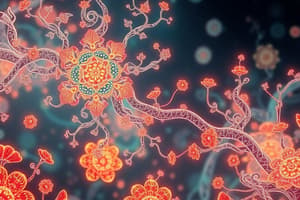Podcast
Questions and Answers
What type of molecules are second messengers?
What type of molecules are second messengers?
- Lipids
- Proteins
- Hormones
- Small molecules (correct)
What is a common property of second messengers?
What is a common property of second messengers?
- They are released in response to primary messengers.
- They cause a conformation change in receptors. (correct)
- They are synthesized by enzymes.
- They are involved in signal transduction cascades.
What type of molecule is released when primary messengers bind to their receptors?
What type of molecule is released when primary messengers bind to their receptors?
- G-protein
- Cyclic nucleotides
- Arachidonic acid
- Second messengers (correct)
What is one of the physiological functions of second messengers?
What is one of the physiological functions of second messengers?
What type of secondary messenger is calcium?
What type of secondary messenger is calcium?
Flashcards are hidden until you start studying
Study Notes
-
Second messengers are molecules that are released by cells in response to extracellular signals.
-
Second messengers trigger changes at the cellular level, such as proliferation, differentiation, migration, survival, apoptosis and depolarization.
-
Second messengers are one of the triggers of intracellular signal transduction cascades.
-
Second messengers can be synthesized and activated by enzymes, for example, the cyclases that synthesize cyclic nucleotides, or by opening of ion channels to allow influx of metal ions, for example Ca2+ signaling.
-
There are three basic types of secondary messenger molecules: cAMP, phosphoinositol, and arachidonic acid.
-
Second messengers have some properties in common: they all trigger a conformation change in receptors, and this change can lead to the production of active second messengers.
-
In most cases, a ligand binds to a receptor, and this binding causes a conformation change in the receptor. This conformation change can affect the activity of the receptor and result in the production of active second messengers.
-
When the receptor is bound by the G-protein, the G-protein activates a series of enzymes, which in turn produce active second messengers.
-
Second messengers are small molecules that help activate other proteins in the cell.
-
Some second messengers are released when primary messengers bind to their receptors.
-
Second messengers can activate different proteins in a cell, which can lead to different physiological effects.
-
One type of second messenger is calcium.
-
Second messengers are important for many physiological functions, including muscle contraction, fertilization, and neurotransmitter release.
Studying That Suits You
Use AI to generate personalized quizzes and flashcards to suit your learning preferences.




